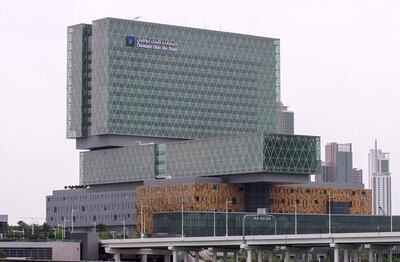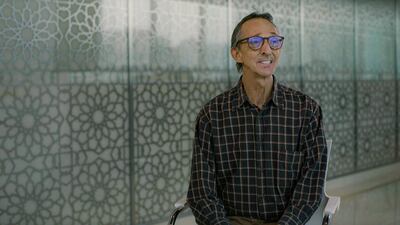An Abu Dhabi teacher found out that a sudden itch all over his body was potentially fatal.
Dale Yost, 66, sought the advice of a dermatologist and was prescribed tablets and cream to deal with the issue.
When the itching persisted, he grew concerned and went back for more tests and blood work at the first hospital he visited. He was told he had gallbladder and bile duct cancer.
“It sounds so strange that an itch can be a sign of cancer,” Mr Yost said.
“They could tell by the scans that my bile ducts were plugged and so all the bile was building in my body and causing jaundice and the itchiness.
“The doctors twice tried to put stents in so that the bile could flow into the small bowel again, with no luck.”
The hospital attempted a biliary drain – a procedure where bile is collected in a bag outside the body.
“I had that pouch on me for a couple of weeks before the hospital recommended that I transfer to Cleveland Clinic Abu Dhabi for the complex surgery to remove the cancer.”

Dr Naveed Ahmed, the surgeon in the Digestive Disease Institute at Cleveland Clinic Abu Dhabi who treated Mr Yost, said they had to carry out a central hepatectomy, which involved the removal of the bile duct and gallbladder, as well as three quarters of his liver.
"About 90 per cent of gallbladder cancers are unresectable [not capable of being surgically removed], so treating with this procedure is quite uncommon," Dr Ahmed said.
“The surgery required a lot of technical capability and a team with expertise in interventional radiology, advanced endoscopy, gastroenterology and wound care.”
Dr Ahmed said the decision to remove such a significant portion of the liver is done only in rare cases.
“If the tumour is on the periphery, you only need to remove the diseased portion, but for central tumours, we have to remove the healthy part of the liver as well to prevent it from spreading.”
While the liver is the only organ in the human body that can regenerate, Dr Ahmed said it depends on how much of the liver can be saved.
“If the remnant is small for the size of the patient, it can be fatal. In Dale’s case, where the cancer had spread outside the liver, a transplant was not an option either,” he said.
“We were lucky that we could preserve a healthy portion, making it possible to save his liver.”
Mr Yost’s liver-related tests show that his liver has grown to a normal size and is functioning at an optimum level.
He is now undergoing chemotherapy to treat the cancer in his lymph nodes.
Mr Yost, who is a father of three and grandfather to 10, plans to retire at the end of the year. He revealed that his family wanted him to return to his home in Canada earlier for treatment.
“If this had happened back home, I would have avoided seeing a doctor because of the wait times to get an appointment,” Mr Yost said.
“The health care in Abu Dhabi, and Cleveland Clinic Abu Dhabi in particular, is superior. You just walk in and an integrated team of physicians, surgeons, dieticians and wound care nurses are by your side to aid your recovery.”

